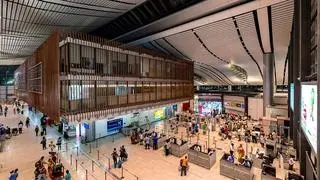Digitisation to bring in transparency while removing paper-based compliance requirements, bringing fuel under the purview of GST, accelerating infrastructure and tweaking recently introduced tax norms are some of the key demands from logistics players including Spoton Logistics, TCI, Pickrr and AIMTC ahead of the Budget. These demands come as Government looks to lower logistics costs to improve the competitiveness of ‘Made in India’ products.
Abhik Mitra, MD and CEO, Spoton Logistics, said that government should boost digitisation to drive transparency and bring in the required predictability in logistics. “Another step that the government must take is to bring fuel under the purview of GST. While goods are moved from one place to another, it is generally required for the transporter to carry a hard copy of the invoice, the government must also do away with this by way of e-way bill digitisation.”
National Logistics Policy will lead to enhanced ease of doing business: Piyush Goyal
Paperwork
High degree of compliance and paperwork make it difficult for technology companies to serve the global audience, forcing companies to shift base outside the country, said Dhruvil Sanghvi, Chief Executive Officer, LogiNext, adding steps in this direction would help high-growth companies keep base in India, generate employment, and revive the national economy after the shock.
Rhitiman Majumder, Co-founder, Pickrr, also called for digitisation of documentation and seamless transfer of documents from one agency to another, lowering compliance burden on logistics players.
ICRA Ratings expects pressure on logistics sector in near term
Having a common platform across various modes of transport and connecting various silos of data being generated is something that Vineet Agarwal, who is President, Assocham, and MD, TCI, had prioritised.
Clauses regarding TDS
Meanwhile, the All India Motor Transport Congress (AIMTC) has asked for a favourable consideration on two clauses regarding tax deduction at source (TDS) for transporters, according to Kultaran Singh Atwal, President, AIMTC. Transport is a cash-heavy business, and transporters have to pay 2 per cent TDS on transactions of over ₹1 crore. So, they would like to be exempted from this, like agriculture produce marketing companies.
Also, a lot of customers of transporters deduct 2 per cent tax at source and do not pass it on to government, which means transporters cannot even claim such refunds, explained Naveen Gupta, Secretary General. AIMTC, adding that refunds are received after almost three years, which blocks working capital. A relaxation on this issue of “ kuchha (informal) bills” — that was introduced in 2015 — is supported by the Road Ministry as well, it is learnt.
AIMTC also represented against the government move to have presumptive tax based on gross vehicle tonnage of vehicle (introduced in 2018), pointing out that a shift from the norm a year before when tax was imposed on each truck has led to a manifold increase in outgo. This clause requires a rethink, more so with the income uncertainties in the pandemic year, pointed out AIMTC.
Ocean freight rates
Alok Sharma, CEO and Co-founder, NebulARC, was for government intervention to consider lowering ocean freight rates that are driven by the demand-supply scenario (as) this will reduce the shortage of containers that occurred due to port congestion and delays last year.







Comments
Comments have to be in English, and in full sentences. They cannot be abusive or personal. Please abide by our community guidelines for posting your comments.
We have migrated to a new commenting platform. If you are already a registered user of TheHindu Businessline and logged in, you may continue to engage with our articles. If you do not have an account please register and login to post comments. Users can access their older comments by logging into their accounts on Vuukle.